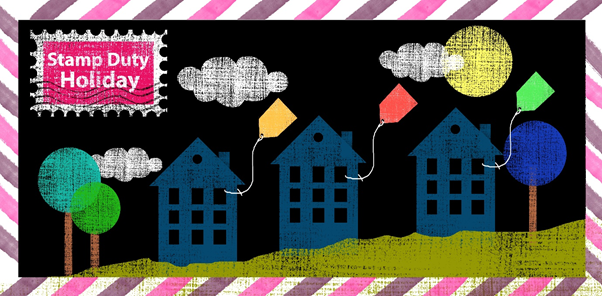What do you mean by Stamp Duty Holiday?
Stamp duty is a tax imposed on single property buys or reports (counting, generally, most authoritative archives like checks, receipts, military commissions, marriage licenses, and land exchanges). An actual income stamp must be appended to or urged the report to show that stamp duty had been paid before the archive was lawfully successful. More current variants of the assessment at this point don't need a genuine stamp.
Stamp duty holiday implies that anybody finishing a buy on a principal home, which costs up to a specific limit sum, won't be needed to pay any Stamp Duty on purchases made up to a particular date when the payment holiday ends.

Source: Copyright © 2021 Kalkine Media
Understanding Stamp Duty Holiday
Initially acquainted in 1684 to raise government income, Stamp Duty Land Tax (SDLT) presently applies to properties available to be purchased in England and Northern Ireland; however, applies to houses over a specific threshold. Before the stamp duty holiday declaration, the SDLT slab was £125,000 for private properties and £150,000 for non-private properties or land available to be purchased.
To battle the impacts of the Covid pandemic on the real estate market, a stamp duty tax holiday was conceded by the Chancellor in England on the 8 July 2020, implying that till 30 June 2021, people in England and Northern Ireland buying homes will not need to pay any tax on houses or properties up to £500,000. This is an expansion from the past cut-off time of 31 March 2021. In any case, note that properties that cost more than £500,000 will, in any case, pay stamp duty tax dependent on a level of their worth over this sum.

Source: Copyright © 2021 Kalkine Media
With such countless individuals furloughed or made redundant because of the pandemic, the move is intended to help purchasers who are enduring monetarily, boosting the striving lodging economy, and speeding up industry usefulness.
Nonetheless, for first-time purchasers or downsizers particularly, except if you live in a space where house costs are significantly more costly, like London or Edinburgh, the stamp duty holiday will not have many effects. In established truth, for first-time purchasers, it very well may be tougher to get a home loan supported because, amid monetary difficulty and vulnerability, banks are less inclined to loan to first time purchasers as it is all the more dangerous, particularly on the off chance that they don't have a decent amount of reserve funds.
The tax holiday will gigantically affect the more extensive development industry, which is now becoming clear. June saw the quickest ascent in development activities for almost two years, with new orders settling following 3 months of sharp decay.
Essentially, buying action extended at the quickest rate since December 2015 importance; for housebuilders and workers for hire, the holiday means to help interest as mortgage holders will want to manage the cost of additional without the stamp duty tax.
It has been assessed that the average stamp duty bill will fall by £4,500, with almost nine out of 10 individuals purchasing a home this year paying no stamp duty, leaving individuals with either more discretionary cashflow or the additional assets to buy more costly lodging, thus returning more cash to the market.
A more extensive set of enterprises is additionally prone to be influenced, like self-storage. The UK self-storage yearly report 2020 tracked down that 32% of self-storage clients in the UK were associated with moving house – confirmation that regardless of the pandemic, house buys are as yet occurring, and self-storage is a helpful product.
While, for some purchasers, the public authority's suggestion to travel only where necessary during the pandemic implied that self-storage gave an ideal chance to store furniture, innovation, and family things for those left in an in-between state. Additionally, the presentation of the stamp duty holiday may imply that individuals right now living in leased convenience may now have the option to bear the cost of a house sooner, thus moving into a more modest property for a brief timeframe to save could be an extraordinary thought to exploit while you can. 44% of those overviewed in the yearly report expressed that the absence of pace was their most appropriate justification requiring capacity.
According to various research, a buyer can save anywhere between 1-3% of the total property amount, which can significantly impact the soaring prices of the real estate markets. Second-home buyers and landlords can also benefit from this offer but will have to pay the extra percentage of stamp duty they were charged under the previous rules and regulations.
Frequently Asked Questions
- Can a purchaser benefit if they have purchased a property before the announcement of the Stamp Holiday?
If the consumer has already brought the property before the stamp holiday has been announced, the benefit cannot be availed.
There can be cases wherein the property is being bought, but the contracts haven't been completed. In that case, the stamp holiday can be availed as the stamp duty is paid after the agreement exchanging process has been completed.
 Please wait processing your request...
Please wait processing your request...